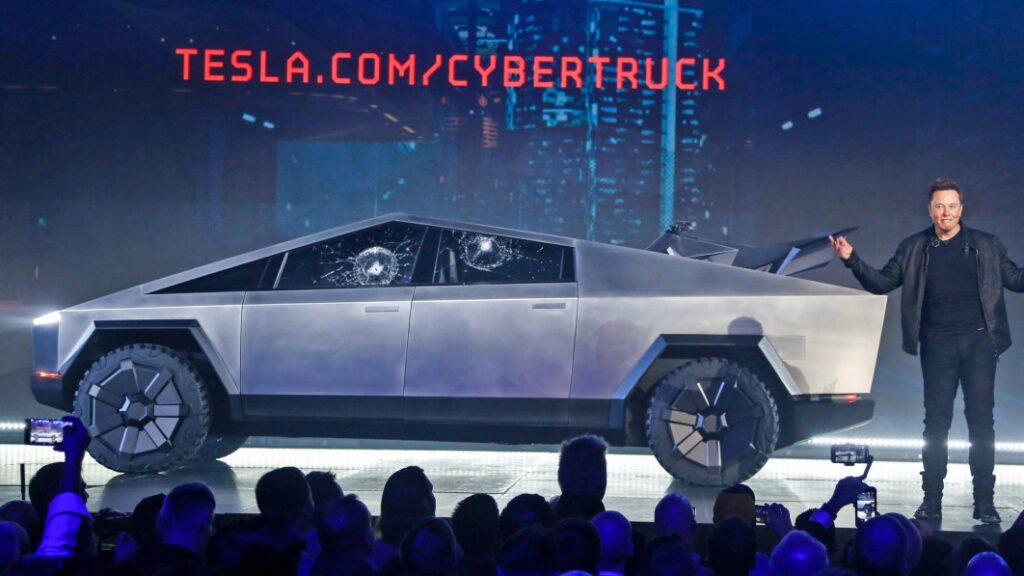'It looks like a child's toy': 3 car designers react to the Tesla Cybertruck

The
Tesla Cybertruck is coming to customers soon, and it looks almost identical to this early prototype.
Samantha Delouya
Tesla’s Cybertruck is closer than ever, so we asked three experts on car design what they think about it.
None were big fans of the design.
They said the Cybertruck was “crude” and “looks like a child’s toy.”
To some, the upcoming Tesla Cybertruck looks like a clumsily designed, doorstop-shaped monstrosity. To others, the pickup’s stainless steel body and bold, science fiction-inspired styling further prove Elon Musk’s unparalleled genius for shaking up the car business.
It all depends on who you ask about what’s quite possibly the most controversial new vehicle in recent history.
Given that Cybertrucks are supposed to finally make it to customers any day now, we decided to get some expert opinions on its appearance from three car designers. It’s a small sample size, to be sure, but none of the experts we polled were huge fans.
“I haven’t seen the thing in person yet, but do I really want this threatening-looking thing driving down my street? In my neighborhood? Not really,” Paul Snyder, chair of the transportation design department at Detroit’s College for Creative Studies, told Insider. “It’s not something I would do or buy,” he added, calling attention to the truck’s dead-flat surfaces and lines.
Car companies will often show off adventurous initial designs for a new model, then tone things down when the time comes to actually make it. The near-production Cybertrucks that have been spotted on social media and out in public, however, appear nearly identical to the outlandish, angular truck Tesla unveiled nearly four years ago.
Instead of mimicking the upright, boxy shape of conventional pickups, Tesla’s truck looks more like a triangle. Its body panels are straight as a board, not curved like the competition from Ford and General Motors.
Elon Musk unveiled the Cybertruck to the world in 2019.
Frederic J. Brown/AFP
“The aesthetic messaging there is it’s kind of a big f— you to everybody,” said Snyder, whose design credits include the Honda Odyssey minivan and cult-favorite Ford Flex SUV. “And I think that’s the point that they’re trying to make, especially to Detroit pickup trucks and everybody who would buy one.”
Matteo Licata, a former car designer and design history professor at Italy’s IAAD (Istituto d’Arte Applicata e Design), said he applauds Tesla’s courage to break norms but that its execution missed the mark.
“I can get behind that kind of lo-fi aesthetic, a brutal design that reminds me of the origami cars turned up to 11,” he said, referring to a school of car design that produced wedge-shaped icons like the DeLorean DMC-12 and Lotus Esprit, a car Musk has said inspired the Cybertruck.
Subtle tweaks here and there could have elevated the final product’s aesthetic appeal, he said.
“In car design, you wouldn’t believe how much of a difference some small changes make,” Licata said. “I mean they had time, hell, to perfect it. It wasn’t a rush job.”
Geoff Wardle, the former executive director of the transportation systems and design department at California’s ArtCenter College of Design, told Insider the Cybertruck isn’t his cup of tea.
“Personally, it doesn’t turn me on at all. I think it looks crude,” he said. “But I understand totally what it’s trying to do.”
He said he thinks the “in-your-face, no-nonsense, extreme-looking” truck may prove popular among Musk’s loyal fanbase — if Tesla can manage to produce it with good fit and finish, which could be challenging given the unusual design.
Whether the Cybertruck will stand the test of time is another question. Simplicity and purity are hallmarks of timeless design, Snyder said, and Tesla’s wacky truck could fit the bill.
“You could say that the Cybertruck is also simple and pure — to the extent that it looks like a child’s toy made of Legos or something,” he said. “So maybe it could be timeless and continue to be controversial for decades.”



